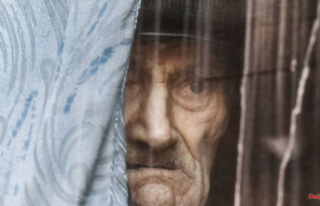Nobody wants to be to blame if there is no more money for recipients of basic security at the beginning of 2023. But an agreement on the new citizens' income will hardly be possible in time. In addition, the Union disagrees with too many points.
From January 1st, the traffic light coalition would like to replace the Hartz IV basic security scheme, which is still part of Agenda 2010, but the time for the introduction of the new citizens' allowance is becoming increasingly scarce. So close that even the opposition is now calling for haste. "Time is of the essence," said Union faction deputy Hermann Gröhe on Monday, underlining the offer by party and faction leader Friedrich Merz to separate the increase in the standard rate from the rest of the bill.
In concrete terms, this means that the Bundestag could decide this week that recipients of basic security will receive more money in the future - the governing parties would like to increase the standard rate for single adults by 53 euros to 502 euros. All controversial questions about the further structure of the citizens' income could be clarified later.
"My impression is that the mediation committee will ultimately be the place where people's income will be discussed," said CDU General Secretary Mario Czaja. So far, the traffic light coalition has rejected the proposal to raise the standard rates independently of the further development of citizen income.
There is a need for clarification on several central points: The Union criticizes the planned two-year waiting period for the examination of housing and assets. During this time, according to the traffic light plans, the state will cover heating and any rental costs without checking whether the benefit recipient lives in an apartment that is appropriate in terms of size and rent. The amount of any assets that may be available is also irrelevant.
"The waiting periods create false incentives to continue receiving benefits and are a burden on taxpayers," says a position paper by the CDU and CSU parliamentary group. This is "unplaceable for low-income workers who help finance the benefits for the unemployed with their taxes." The SPD acts "anti-socially for those who are willing to work on low wages," criticized the CSU politician Sabine Scharf, Bavarian Minister for Family, Labor and Social Affairs.
In addition, the Union faction complains that the waiting period does not differentiate between a beneficiary who slips into basic security after many years of work and someone who has never been employed.
The traffic light coalition plans for a new, six-month "trust period" at the beginning of the benefit receipt, so that breaches of duty by the recipient will not be punished in this phase. Placement offers can be rejected, further training can be canceled without affecting the amount of support. Thereafter, reductions in performance initially amount to 20 percent, and subsequently to a maximum of 30 percent of the standard requirement. The assumption of housing and heating costs is not reduced.
Here, the Union faction sees a weakening of the instrument with which the red-green government wanted to enforce the "demand" factor within the Hartz IV reform in 2005. The principle of "promoting and demanding" has proven its worth. In the area of funding, the CDU and CSU want to improve the way people are addressed and integrate people in need of help into the labor market. "When it comes to challenges, we clearly rely on participation." The Union therefore rejects basic security without the possibility of benefit cuts, even if this option is only temporarily denied.
"Any support also requires the participation of those affected," writes the Union faction. Without them, the need for help cannot be overcome. From the Union's point of view, the government plans fall short of the possibilities that the Federal Constitutional Court pointed out in its judgment on Hartz IV sanctions. Union faction vice Gröhe called on the traffic light to end its "mental blockade".
The traffic light coalition does not need the consent of the Union for a resolution of the law in the Bundestag, which could fall on Thursday. But she is dependent on the CDU and CSU if the law has to be decided on November 25 in the Bundesrat. If the government and opposition cannot agree on a compromise, then the law must go through a mediation process. The launch date of January 1st would therefore hardly be achievable.












